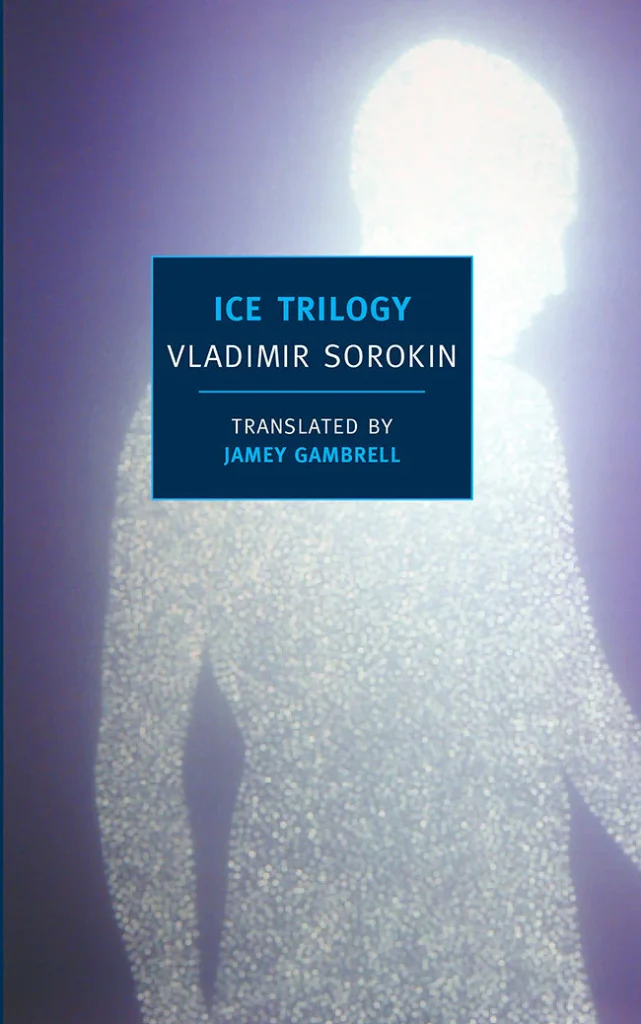
translated by Jamey Gambrell
original publication (in Russian): 2006
this edition: NYRB Classics, 2011
grab a copy here or through your local independent bookstore or library
So my first thought after finishing the 700+ page Ice Trilogy was: “what the &^$&^% did I just read?”
My next thought was: “what did other reviewers think about it?” Here is a sample:
- “Sorokin’s novel does exercise a monstrous fascination”- Christian Caryl, The New York Review of Books
- “The glib thing would be to declare Ice a spoof of Russia’s recent totalitarian past, or of totalitarianism or ideology or religion in general, but Sorokin’s ice cult hardly resonates with anything historical. Ice is much less a satire than a single monstrous vision: human beings are no more than “meat machines,” a race unable to communicate on a truly intimate scale and unworthy of continued existence.”- Ken Kalfus, The New York Times Book Review
- “What to make of the novel ? Is it pure allegory ? A political or religious statement ? A science fiction entertainment ? Who knows. Ice remains mystifying and often frustrating. Yet despite that, and despite the numbing repetitiveness of the ice-experiments, and despite the ridiculous premise there’s much that is compelling here.” – M. A. Orthofer, Complete Review
Basically, Sorokin takes the Tunguska Event of 1908 (when a 3-5 megaton explosion flattened over 2,000 sq km of pine forest in Siberia- perhaps from a comet or asteroid) and imagines that it is actually special cosmic ice that will “awaken” 23,000 blond-haired, blue-eyed chosen people. Apparently, these people are actually Brothers of the Primordial Light, who created the various planets and celestial objects in the universe. When they decided to mess around one day and create a watery planet called Earth, they were reflected in the oceans and became trapped, evolving over eons to become humans. Their special souls, though, are reincarnated in every generation, thus preserving all 23,000 “brothers and sisters.” They have to find one another, hold hands in a circle, and “speak with the heart” in order to break free of the Earth, find their way back into space, and thus dissolve the Earth.
That’s the absurd premise. The way that Sorokin goes about developing it is actually masterful and head-spinning, if grotesque in places. As the various Brothers and Sisters explain over the course of the narrative, it is change that they despise, since the other planets they had created before Earth were perfect and dead. The narrative itself, interestingly enough, is filled with shifts and swerves, including multiple narrators, writing styles, and historical eras. The Brothers and Sisters infiltrate Lenin’s and Stalin’s governments, the Nazi high command, the millionaire class, and even start their own ICE corporation in the late 20th century to cover up their activities. These activities are…bizarre. In order to find one another, the chosen attach pieces of the Tunguska ice to poles and bash in the chests of other blue-eyed blonds. If they find a brother or sister, they hear a new name being “spoken” by the heart (these are all one or two syllable names). It worked well when two of the chosen were able to sense their compatriots, but when these two die, it’s up to the rest of the Brotherhood to figure out who’s one of them. Thus thousands of blue-eyed blonds around the world are kidnapped and bashed in with the ice, with most of these people dying from the blows and not “speaking with the heart.” The chosen call these people “empties.”
Some of the characters (especially the first main character, who’s “real” name is “Bro”) have extensive and interesting back stories, involving life before the Russian Revolution, before World War II, and during the Cold War. Ice is thus a sweeping historical narrative based on real events, but with a completely bizarre plot overlaid on them. The physiological and psychological changes that each chosen person goes through, however, makes it seem as though something real is happening to them, perhaps because of the ice or because of a mass hallucination.
Sorokin’s ability to drive the plot forward and bring the reader along for the wild ride is impressive. I found myself wanting these 23,000 delusional people to find each other, just so I could see what would happen at the end. And what an ending–of course it was strange, disappointing, and answered literally nothing. Nonetheless, Sorokin offers readers a strikingly unique look at totalitarian politics, delusion, and cultish institutions.
Also, I don’t know if this was part of the book or just a misprint, but about 50 pages were printed upside down. I tend to think this was deliberate, since the book is insane and also flipped around when a character fell to the ground and was looking up. This is kind of like when you go to a museum and see cans or something piled in the corner and you wonder if it’s supposed to be art or it’s just trash accidentally left there. If this book sounds like something you’d enjoy, go for it. But remember, it’s 700+ pages of batsh*t craziness. Enjoy.

1 comment on “Review: Ice by Vladimir Sorokin”